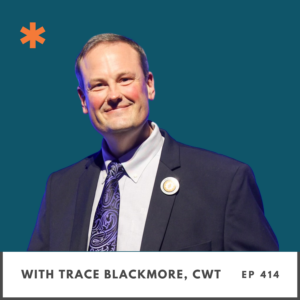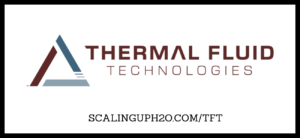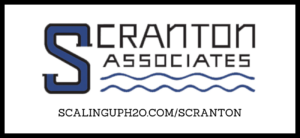 438 Innovative Water Treatment Chemistry with Matheus Paschoalino
438 Innovative Water Treatment Chemistry with Matheus Paschoalino
Scaling UP! H2O
Can a carbon-negative, bio-based molecule replace legacy phosphonates and help you use less azole—without sacrificing corrosion performance? In this episode, host , welcomes Senior Business Development Manager and Microbial Control SME of , to unpack polyhydroxycarboxylic acids (PHCs) and how they’re changing cooling-water programs from the field up. We cover HEDP replacement in light-duty systems, azole enhancement in copper-challenged waters, a second-generation cut for heavy-duty heat flux, and PHC behavior with oxidizers and non-oxidizer biocides. From Bioforge to Basin:...
info_outline 437 Redefining HR: The Key to Talent & Culture in Water Treatment
437 Redefining HR: The Key to Talent & Culture in Water Treatment
Scaling UP! H2O
What if HR wasn’t the department you dreaded — but the partner that helped your team thrive? In this episode of Scaling UP! H2O, host Trace Blackmore welcomes , HR Director at , to explore how human resources can be a strategic driver of talent, culture, and profitability in the water treatment industry. Redefining HR’s Role Tia shares her journey into water treatment and how she built HOH’s HR department from the ground up. Instead of treating HR as a compliance function, she reframed it as a leadership partner—focused on employee connections, transparent...
info_outline 436 Raising the Bar: Legionella Management & Industry Standards
436 Raising the Bar: Legionella Management & Industry Standards
Scaling UP! H2O
With those words, Jemma Tennant highlights one of the most profound differences between Legionella management in Europe and the United States. In this episode of Scaling UP! H2O, host Trace Blackmore welcomes , Chair of the Water Management Society (WMSoc), to explore how legislation, enforcement, and professional training shape the fight against Legionella. Proactive Regulation and Duty of Care The UK treats Legionella as a foreseeable and preventable risk. Jemma explains how laws like the Health and Safety at Work Act and COSHH Regulations require mandatory Legionella risk...
info_outline 435 Optimizing Legionella Control Strategies with Dr. Vincenzo Romano Spica
435 Optimizing Legionella Control Strategies with Dr. Vincenzo Romano Spica
Scaling UP! H2O
Legionella remains one of the most complex challenges for water professionals worldwide. How do we balance effective monitoring with realistic costs—and which strategies deliver true public health impact? In this episode, Trace Blackmore welcomes Head Public Health University of Rome "Foro Italico to explore new insights from his comparative research on Legionella control. Reframing Legionella Risk Dr. Spica explains why public health data increasingly points to Legionella pneumophila—not all Legionella species—as the primary concern for human health. He shares how...
info_outline 434 Encore Interview with Patsy Root
434 Encore Interview with Patsy Root
Scaling UP! H2O
“Rules written in a panic rarely stand the test of time.” In this encore episode, Trace Blackmore welcomes back , Senior Manager of Government Affairs at IDEXX Water and active member of the AWT Legislative and Regulatory Committee. Patsy brings global data, case studies, and clear recommendations for smarter Legionella regulation — and why a targeted focus on Legionella pneumophila can save both lives and resources. From Outbreaks to Proactive Policies Patsy unpacks a central truth: most regulations emerge reactively, often after a high-profile outbreak. Drawing on...
info_outline 433 Legionella Investigations and LIDO Technology
433 Legionella Investigations and LIDO Technology
Scaling UP! H2O
What if preventing Legionella outbreaks wasn’t about adding more chemicals, but removing what the bacteria needs to survive? In this episode of Scaling UP! H2O, host Trace Blackmore talks with Dr. David Krause, Certified Industrial Hygienist, toxicologist, and founder of HC3, about his groundbreaking approach — LIDO (Legionella Inhibition by Deoxygenation). Legionella on the Rise Dr. Krause has investigated high-profile Legionella outbreaks and seen firsthand how current prevention strategies often fall short. Despite ASHRAE 188 standards, CMS requirements, and increasing water...
info_outline 432 Water Management Plans: Evolving Standards and Best Practices with Matt Freije
432 Water Management Plans: Evolving Standards and Best Practices with Matt Freije
Scaling UP! H2O
"Just because you have a water management plan doesn’t mean it’s working." That’s the hard truth Matt Freije, founder and CEO of HC Info, delivers in this episode of Scaling UP! H2O. As the architect behind LAMPS — a leading cloud-based platform for water management programs — Matt joins Trace Blackmore to explore the critical evolution of water safety, compliance standards, and real-world implementation challenges facing facilities in 2025. Beyond the Binder: Water Management Plans That Actually Work In an era of heightened awareness and shifting regulations,...
info_outline 431 Legionella Awareness Month Kickoff!
431 Legionella Awareness Month Kickoff!
Scaling UP! H2O
Are You Ready to Talk About Legionella? Every August, we dedicate an entire month to a topic that touches public health, liability, and the core of what water treaters do — yet it’s still misunderstood by many: Legionella. In this episode, Trace Blackmore kicks off Legionella Awareness Month by returning to the basics. Where did Legionella get its name? What makes it dangerous? And why is there still confusion between a water treatment program and a water management plan? Tracing It Back: History, Misconceptions, and Missed Conversations Trace opens with the 1976...
info_outline 430 PFAS Regulations and Technologies with Brian Liotta
430 PFAS Regulations and Technologies with Brian Liotta
Scaling UP! H2O
“The winning combination will include not just removal—but real destruction of PFAS.” - Brian Liotta PFAS: The Invisible Challenge Reshaping Water Treatment PFAS chemicals are everywhere—from consumer products to our bloodstream. But as regulations tighten, water treatment professionals must now evolve faster than ever. In this episode of Scaling UP! H2O, host Trace Blackmore speaks with , Director of Marketing and Product Development at , about the shifting regulatory landscape and the advanced technologies being developed to monitor, remove, and destroy PFAS compounds. ...
info_outline 429 The Life and Career of Jim Lukanich
429 The Life and Career of Jim Lukanich
Scaling UP! H2O
“You can’t learn it all in one year. You can’t even learn it all in ten.” That single statement from Jim Lukanich captures the spirit of this unforgettable episode. Returning to the for the first time since Episode 10, joins host to reflect on a remarkable 44-year career in the water treatment industry. From his early days at U.S. Steel to leading technical innovation at Buckman Laboratories, ChemCal, U.S. Water, and Kurita, Jim has been a force for mentorship, learning, and raising the bar in technical excellence. Building a Career, One Problem at a Time Jim...
info_outline"Scaling is like debt—it’s always better to prevent it than to clean it up later."
 Phosphate plays a crucial role in Industrial Water Treatment, yet it remains one of the most misunderstood chemicals. In this Pinks and Blues episode, Trace Blackmore revisits phosphate chemistry and its application in cooling systems, corrosion prevention, and scale inhibition.
Phosphate plays a crucial role in Industrial Water Treatment, yet it remains one of the most misunderstood chemicals. In this Pinks and Blues episode, Trace Blackmore revisits phosphate chemistry and its application in cooling systems, corrosion prevention, and scale inhibition.
Breaking Down Phosphate Chemistry
Phosphate exists in different forms, each with specific applications in water treatment.
- Orthophosphate (PO4³⁻): The simplest and most reactive form, used for corrosion inhibition.
- Polyphosphate: A longer chain of phosphate molecules that can hydrolyze into orthophosphate.
- Organic Phosphates: Phosphate compounds bonded with organic molecules, often used in scale inhibition.
- Total Phosphate: A combination of all phosphate types in a system.
Phosphate Testing – What Every Water Pro Should Know
Phosphate levels must be carefully monitored to maintain system integrity. Trace explains:
- Why the orthophosphate test is the most reliable for phosphate analysis.
- How to convert different phosphate forms to orthophosphate for testing.
- The difference between the Molybdate Vanadate Method (yellow test) and the Ascorbic Acid Method (blue test).
- The importance of accurate dilution and testing procedures to prevent measurement errors.
Challenges and Considerations in Phosphate Treatment
- Biological Growth: Phosphate serves as a nutrient, promoting microbial growth if not controlled properly.
- Environmental Regulations: Certain facilities may have phosphate discharge limits.
- Calcium Phosphate Scaling: High temperatures and improper phosphate dosages can cause severe scaling issues.
Best Practices for Phosphate Management
- Monitor carbon and alkalinity levels to determine the best phosphate formulation.
- Use stability indices (e.g., Ryzner Stability Index, Langelier Saturation Index) to predict scale formation.
- Adjust treatment strategies based on pH levels and system conditions to avoid unintended scale buildup.
- Always verify environmental discharge limits when using phosphate-based treatments.
Mastering phosphate chemistry and testing techniques ensures better system performance, cost efficiency, and regulatory compliance. This episode empowers water professionals to optimize their approach to phosphate-based treatments. Tune in to learn practical strategies for optimizing phosphate levels, preventing scale, and ensuring system efficiency.
Stay engaged, keep learning, and continue scaling up your knowledge!
Timestamps
03:16 – Trace Blackmore shares the importance of Quarterly Planning for Business and Personal Goals
06:30 – Upcoming Events for Water Treatment Professionals
08:20 – Water You Know with James McDonald
12:03 – Introduction to Phosphate and Its Role in Water Treatment
18:31 – Understanding Phosphate Forms: Orthophosphate, Polyphosphate, Organic Phosphate
21:32 – Phosphate as a Corrosion & Scale Inhibitor in Cooling Systems
34:33 – Testing Phosphate: Why the Orthophosphate Test is Key
51:37 – The Importance of Understanding Water Chemistry Before Selecting Treatment Plans
Connect with Scaling UP! H2O
Submit a show idea: Submit a Show Idea
LinkedIn: in/traceblackmore/
YouTube: @ScalingUpH2O
Click HERE to download Episode’s Discussion Guide
Scaling UP! H2O Resources Mentioned
Ep 046 The One About Phosphate Testing
Ep 024 The One With All the Questions
Taylor Technologies Test Procedures: Phosphonate, Azole
AWT (Association of Water Technologies)
Scaling UP! H2O Academy video courses
Water You Know with James McDonald
Question: What is the process called to evaluate the performance and efficiency of a water softener by taking regeneration water samples, measuring their salinity, and interpreting their results?
2025 Events for Water Professionals
Check out our Scaling UP! H2O Events Calendar where we’ve listed every event Water Treaters should be aware of by clicking HERE.



